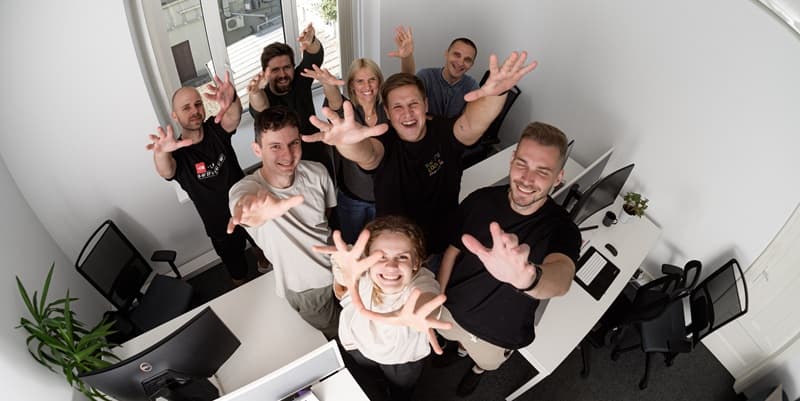Logistics Platform Swotzy Helping Latvian Companies Expand into International Markets

Attēls: Swotzy
Logistics is often considered to be a complicated and inflexible business where new players can offer no significant change. However, a smart approach, user-friendly technologies and excellent customer service has allowed Latvian company Swotzy to prove this assumption wrong. Swotzy is an easy-to-use digital platform allowing businesses to compare the delivery options offered by various courier services and choose the best solution. Moreover, customers don’t need to conclude individual contracts with each service provider as these are concluded by Swotzy. Thus, even small businesses get to take advantage of the volume prices usually enjoyed only by the “big guns”.
“We combine the amounts of deliveries to be made for many companies into one contract with a courier service which allows us to secure prices which would normally only be available to larger companies. By doing so, we help small businesses be more competitive in the global market,” Lauris Rutkis, co-founder of the company, explains the basic operating principles of the platform.
This approach means that Swotzy customers can quickly and easily choose a delivery option without having to spend additional time to conclude contracts or integrate IT systems. Delivery costs are up to several times lower, which, for small businesses, can often be a decisive factor in their development and even survival.
The idea was born just a few years ago
Swotzy was founded in 2022 when Mr Rutkis, who was at the time still working at printing company Printful where he managed global logistics, saw first-hand how complicated and often inefficient delivery organisation could be. “Together with the other two co-founders (Kristians Jenčiuss and Jēkabs Hincenbergs) we decided that we could create an easier and better solution, especially for customers who are just starting up their business,” he explains.
At first, there was just the idea and a newly-founded company, but less than a year later, in early 2023, Swotzy attracted its first investments – EUR 90 000 from Firstpick, a Lithuanian business accelerator and venture capital fund. According to Mr Rutkis, this funding gave the trio the boost they needed to quit their day jobs and fully immerse themselves in creating and developing the platform. During that same year the company attracted another EUR 500 000 in investments from Firstpick and Black Pearls, a Polish fund.
Shortly after the founding of the company, Swotzy joined the business incubator established by the Investment and Development Agency of Latvia (LIAA) in Liepāja and took advantage of state support tools: co-financing for the development of their website and technological solutions, as well as the tax reliefs available to start-ups for attracting highly skilled specialists. Start-ups can obtain support from two programmes: co-financing in the amount of 45% for covering the salaries of highly skilled workers or a reduction in the labour taxes to be paid.
An important competitive advantage for businesses
Customers ordering goods from abroad are used to low delivery costs or free delivery if they spend a certain amount. In any case, these delivery costs still must be covered either by the buyer or the seller, and as such they are often factored into the price of the product. However, unlike large companies who can take advantage of their economies of scale, for small businesses international delivery costs are much higher.
“With Swotzy even small market players can get volume discounts on deliveries. For a small business, sending a package to the United States can cost up to four time more than for a large company. These are significant expenses, especially if you need to factor them into the price of your product. As great as your product may be, this makes it much more difficult to be able to compete with the big players. With our help, this barrier to competitiveness is removed,” Mr Rutkis highlights.

Swotzy customers represent a variety of industries, and they are all expanding in e-commerce and delivering their products globally. In Latvia, the platform is being used by such companies as clothing brand RainSisters, natural cosmetics manufacturer Silmachy, vintage clothing seller NorthernGrip, and the SelfNamed.com platform created by start-up Cosmetics Nord for production of custom-ordered cosmetics.
“Our customers include companies who use these cost savings in a very smart way and reduce the prices of their products to improve their competitiveness. Over the course of a year, they have accordingly been able to launch an export breakthrough and increase their deliveries by up to five times,” Mr Rutkis explains.
Another important advantage of the Swotzy platform is its ease of use. “Contrary to the popular opinion, in terms of technological development international logistics is slightly lagging behind other sectors: delivery organising platforms are often complicated and out-dated. However, users of the Swotzy platform do not have to deal with any such inconvenience, because we take care of all system integration and information exchange with the delivery service providers,” Mr Rutkis explains.
Objective: the US market and warehousing network
About 40% of the deliveries processes by Swotzy are delivered to the United States, which is an important export market for many European companies. Therefore, as Mr Rutkis reveals, the next strategic step is for the company to set up its own warehousing infrastructure in the United States to provide even faster and more cost-effective deliveries.
Currently Swotzy is servicing about 700 companies, mostly from the Baltic States, and sending out approximately 30 000 packages per month to more than 120 countries around the world. Swotzy ended 2024 with a turnover of EUR 1.4 million, while its turnover in the first quarter of this year has already reached EUR 800 000. The company plans to end 2025 with a turnover of EUR 5 million.
This article has been produced with financial support from the European Regional Development Fund.
